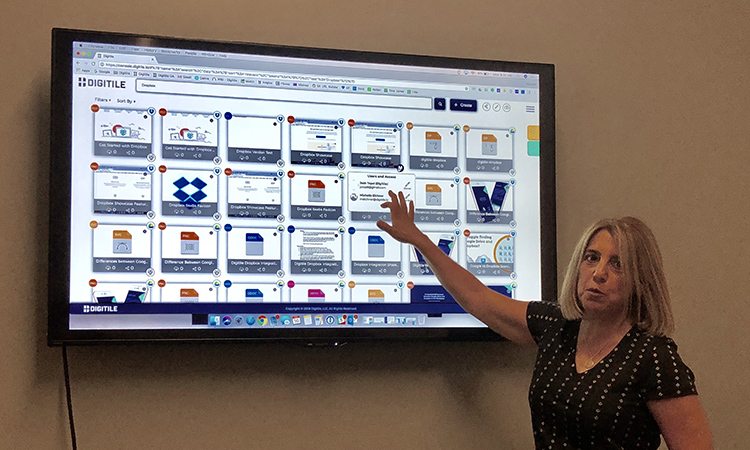Phoenix-based tech startup Digitile believes it has a solution for professionals who need an easier way to find files.
The company this month announced release of its new B2B software-as-a-service (SaaS) system, a search engine for files stored across multiple cloud storage platforms such as Google Drive, Dropbox, and Microsoft OneDrive. The search algorithm combines key words, natural language processing, hashtags, and image recognition to generate search results.
Co-founders Michelle Eichner and Josh Topel started developing Digitile’s software in February 2017 when they noticed how time consuming and frustrating it was so find files they needed for work every day.
“When I use to work in the sales department in IBM I would find myself in situations where I would look in six cloud storage places and I couldn’t find the files I was looking for,” said Topel, Digitile’s chief product officer. “Then I would ask my colleagues who I’ve shared the file with and they would then have to look in six different places on their end.”
Eventually when you’re on deadline for a client presentation, it would be easier to just recreate the file and stop looking to avoid wasting time, he said.
A Gartner study found that professionals spend an average of 18 minutes searching for a file, while International Data Corporation estimated that companies spend almost $20,000 per worker yearly on their employee’s search time.
“We all know time is money and 18 minutes will cost hard dollars on the bottom line,” said Eichner, Digitile’s CEO. “Companies are spending millions of dollars a year just to dig up files.”
Digitile is not the first document management software out there, with key competitors being Square 9 Softworks and Qloud+ by CrossPlatform Cloud Technologies, though Digitile’s software is a bit different.
Digitile’s software does not just mimic cloud storage systems but rather uses artificial intelligence to eliminate the need for folders and works solely as a search engine to allow users to search for files by identifying text within a document or certain features of an image without requiring an exact file name or time stamp.
“Digitile does not disrupt current file synchronization and sharing systems but complimented them instead,” said Topel. “It’s what Google did to the web years ago.”
With people adopting many different types of software to solve their work problems, Digitile connects all those platforms together so there’s no need to sign onto Google or Dropbox again, he said.
Digitile currently has 35 beta users and charges an annual subscription price of $8 per month per user or $10 per month per user without an annual commitment. For companies who have more employees, Digitile also offers volume pricing based on customer needs.
AirDXP, a seven-member advertising technology company based in New York, has been one of Digitile’s beta users from the software’s early stages. Steven Francolla, AirDXP founder and CEO, says engine-based file management software is inevitable not only for internal collaboration between the company’s employees, but external collaboration with customers as well.
“Everybody has their personal preference for where and how to store files and getting to them could be such a pain.” Said Francolla. “At AirDXP we mainly use Google Drive and when our team had to coordinate on a project with an external marketing agency who was sending us all kinds of files on Dropbox, we had everybody join the Digitile platform, so everything was always centralized in one place.”




